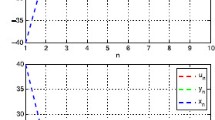Abstract
In this work, we develop a quasi-Newton-type method for equilibrium problems based on the proximal Newton-type structure given in Santos et al. (Optimization Letters 12(5), 997-1009, 2018). We consider a family of matrices verifying a bounded deterioration property. We prove that the sequence generated by the algorithm is well defined and under suitable assumptions we establish the linear convergence of the algorithm. Numerical experiments are reported.

Similar content being viewed by others
References
Belo Cruz, J.Y., Santos, P.S.M., Scheimberg, S.: A two-phase algorithm for a variational inequality formulation of equilibrium problems. Optim. Theory Appl. 159(3), 562–575 (2013)
Bigi, G., Passacantando, M.: Descent and penalization techniques for equilibrium problems with nonlinear constraints. J. Optim. Theory Appl. 164(3), 804–818 (2015)
Blum, E., Oettli, W.: From optimization and variational inequalities to equilibrium problems. Math. Stud. 63(1–4), 123–145 (1994)
Dennis, J.E., Moré, J.: Quasi-Newton Methods, motivation and theory. SIAM Rev. Soc. Ind. Appl. Math. 19(1), 46–89 (1977)
Dennis, J.E., Schnabel, R.B.: Numerical methods for unconstrained optimization and nonlinear equations. SIAM, Philadelphia (1996)
Fan, K.: A minimax inequality and its applications. Inequalities 3, 103–113 (1972)
Farkas, C., Molnar, A.E.: A generalized variational principle and its application to equilibrium problems. J. Optim. Theory Appl. 156, 213–231 (2013)
von Heusinger, A., Kanzow, C.: Relaxation methods for generalized nash equilibrium problems with inexact line search. J. Optim. Theory Appl. 143, 159–183 (2009)
von Heusinger, A., Kanzow, C., Fukushima, M.: Newton’s method for computing a normalized equilibrium in the generalized Nash game through fixed point formulation. Math. Program. 132(1), 99–123 (2012)
Hieu, D.V.: New inertial algorithm for a class of equilibrium problems. Numer. Algorithm. 80(4), 1413–1436 (2019)
Iusem, A., Sosa, W.: New existence results for equilibrium problems. Nonlinear Anal. 116(52), 621–635 (2003)
Iusem, A., Kassay, G., Sosa, W.: On certain conditions for the existence of solutions of equilibrium problems. Math. Program. 116(1), 259–273 (2009)
Iusem, A., Sosa, W.: On the proximal point method for equilibrium problems in Hilbert spaces. Optimization 59, 1259–1274 (2010)
Kassay, G., Miholca, M., Vinh, N.Y.: Vector quasi-equilibrium problems for the sum of two multivalued mappings. J. Optim. Theory Appl. 169, 424–442 (2016)
Luksan, L., Vlcek, J.: New quasi-Newton method for solving systems of non- linear equations. Appl. Math. 62(2), 121–134 (2017)
Nasri, M., Matioli, L.C., Ferreira, E.M.S., Silveira, A.: Implementation of augmented Lagrangian methods for equilibrium problems. Optim. Theory Appl. 168(3), 971–991 (2016)
Oliveira, P., Santos, P., Silva, A.: A Tikhonov-type regularization for equilibrium problems in Hilbert spaces. J. Math. Anal. Appl 401(1), 336–342 (2013)
Santos, P.J.S., Santos, P.S.M., Scheimberg, S.: A proximal Newton-type method for equilibrium problems. Optim. Lett. 12(5), 997–1009 (2018)
Santos, P.S.M., Scheimberg, S.: An inexact subgradient algorithm for equilibrium problems. Comput. Appl. Math. 30(1), 91–107 (2011)
Scheimberg, S., Jacinto, F.: An extension of fkkm lemma with application to generalized equilibrium problems. Pacific J. Optim. 6(2), 243–253 (2010)
Scheimberg, S., Santos, P.: A relaxed projection method for finite-dimensional equilibrium problems. Optimization 60(8–9), 1193–1208 (2011)
Vinh, N.D., Gibali, A.: Gradient projection-type algorithms for solving equilibrium problems and its applications. Computational and Applied Mathematics. https://doi.org/10.1007/s40314-019-0894-5 (2019)
Vuong, P. T., Strodiot, J.J.: The Glowinski-Le Tallec splitting method revisited in the framework of equilibrium problems in Hilbert spaces. J Glob Optim 70, 477–495 (2018)
Funding
The third author was partially supported by CNPq Grant 311825/2019-2.
Author information
Authors and Affiliations
Corresponding author
Additional information
Publisher’s note
Springer Nature remains neutral with regard to jurisdictional claims in published maps and institutional affiliations.
Rights and permissions
About this article
Cite this article
Sousa, L.A., Scheimberg, S., Santos, P.J.S. et al. A quasi-Newton type method for equilibrium problems. Numer Algor 89, 1129–1143 (2022). https://doi.org/10.1007/s11075-021-01148-z
Received:
Accepted:
Published:
Issue Date:
DOI: https://doi.org/10.1007/s11075-021-01148-z




